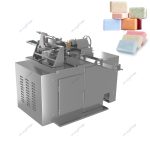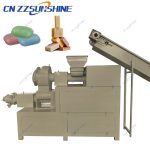Delivering consistent, high-quality bar soap at scale demands a precisely integrated industrial soap production line. This sophisticated machinery transforms raw materials like oils, fats, and lye into finished bars efficiently, whether for laundry soap making lines or premium toilet soap finishing lines. The process hinges on several key machines working in concert.
It begins with robust mixing. An industrial mixer for chemical processing ensures fats, alkalis, and additives combine uniformly under controlled conditions, achieving the critical saponification reaction and the desired soap base consistency. This initial blend is paramount for final bar quality.
The mixed soap base then undergoes refining and shaping. For premium bars, especially within a bath soap making machine setup or beauty soap making line, a three roller mill for cosmetics (or an OEM three roller grinding mill) is often employed. This equipment triple-mills the soap, creating an exceptionally smooth texture and homogeneous mixture. The refined soap noodles proceed to the extrusion stage. Here, a vacuum plodder for soap is indispensable. This soap plodder machine for bar soap compresses the noodles under vacuum, meticulously removing air pockets which could cause cracking or voids. The vacuum plodder extrudes a continuous, dense log of soap ready for cutting.
Cutting precision is vital for both aesthetics and minimizing waste. A custom soap cutting machine, often an electric washing soap cutter, slices the extruded log into uniform blanks with clean edges. Modern automatic soap production lines frequently incorporate an automatic block cutter machine for this stage, ensuring high speed and dimensional accuracy.
Finally, the cut blanks move to finishing. A dedicated toilet soap finishing line might include stamping, polishing, cooling, and wrapping stations. Similarly, a laundry bar soap production line focuses on efficient cooling, drying, and packaging. Throughout the entire industrial soap production line, automation is key. Automatic packing machines for food-grade soap wrap the final product efficiently, while industrial chillers for machinery maintain optimal temperatures for processes like cooling extruded logs or setting stamped bars.
Investing in a well-designed soap making machine system, integrating the right soap mixer, plodder, and cutter technology, significantly boosts throughput, consistency, and overall operational efficiency, meeting the rigorous demands of both household and personal care soap markets.





